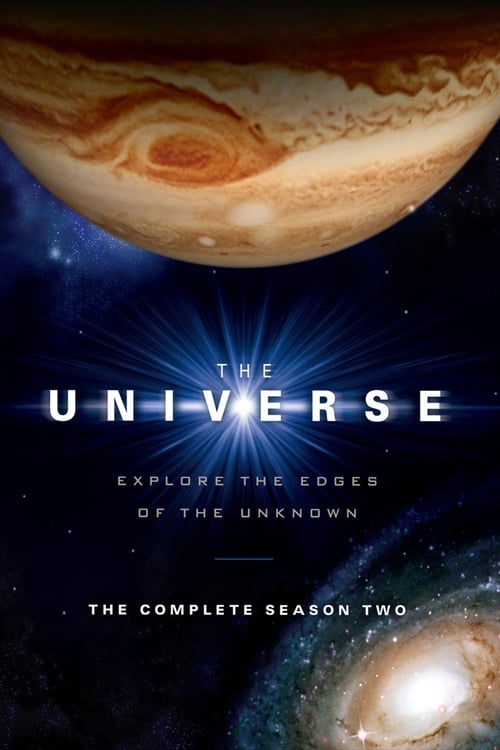
Broadcast date
27-11-2007 • 18 episodes
Episodes of this season
1. Alien Planets

star_border 8
Have planet hunters finally found proof of other Earthlike worlds? Astronomers have now discovered over two hundred alien worlds, beyond our solar system, that were unknown just a decade ago
2. Cosmic Holes

star_border 7
We know black holes exist, and now scientists are trying to confirm that other holes lurk in hyperspace.
3. Mysteries of the Moon

star_border 6
A closer look at the beacon in the dark sky reveals an ever-present source of myth, intrigue, controversy and unsolved mysteries
4. The Milky Way

star_border 8
We used to think that Earth was at the center of the universe, but now we know we're not even at the center of our own galaxy. Countless wonders exist between where earth is situated and the massive black hole at the galactic center of our solar system. Within the Milky Way can be found the debris of old, dying stars fueling the birth of new stars and at the galactic center hypervelocity stars get catapulted clear beyond the Milky Way's outer rim at unimaginable speeds. Come along for a guided tour of 100,000 light-year-wide family of stars and stellar phenomena we call The Milky Way.
5. Alien Moons

star_border 6
Travel from the inner solar system to the Kuiper Belt and explore the moons surrounding the planets of the solar system. Many of these moons that were once unknown are now on the cutting edge of astronomical study.
6. Dark Matter

star_border 5
Scientists have no idea what it is, but Dark Matter and Dark Energy make up 96% of the Universe. Dark Matter is everywhere. It passes through everything we know on earth at billions of particles every second, yet no one has ever gotten a direct detection of this mysterious dark substance. An even more bewildering force is Dark Energy, which is rapidly pushing apart our Universe. Discovered only ten years ago, scientists are struggling to comprehend its unusual characteristics and answer the ultimate question; what is the fate of our Universe?
7. Astrobiology

star_border 5
Does life exist on other planets? Astrobiology is a visionary new science that searches for life in space by combining the disciplines of astronomy, biology and geology. How did life evolve on Earth? What will life look like on other planets? These and other pertinent questions will be answered by a diverse group of scientists.
8. Space Travel

star_border 6
When man finally broke free of the Earth's gravitational pull the dream of traveling to other planets became a reality. Today scientists are proposing a bizarre array of technologies in the hope of traveling faster through space, from space craft sporting sails that catch laser beams, to propulsion engines powered by a bizarre entity known as anti-matter.
9. Supernovas

star_border 7
A stellar explosion, the supernova is the sensational death of a star. It can shine as bright as 100 billion suns and radiate as much energy as the Sun would emit over 10 billion years. Jets of high-energy light and matter are propelled into space and can cause massive gamma ray bursts and emit intense X-ray radiation for thousands of years. Astronomers believe that this process creates the very building blocks of planets, people and plants.
10. Constellations

star_border 7
A constellation is a group of stars that are connected together to form a figure or picture. Explore some of the 88 official constellations and learn about some of the highlights of each.
11. Unexplained Mysteries

star_border 6
A look at myths and mysteries concerning the universe. Includes a possibility that life can be sustained on Mars, an examination of time travel, and the theory of a Dark Star as a companion of our sun. Also, a closer look at the Big Bang theory.
12. Cosmic Collisions

star_border 7
Our universe is a cosmic shooting gallery, gravity is moving everything around & things will collide. Astronomers are attempting to understand how collisions occur in space.
13. Colonizing Space

star_border 6.5
Space colonization is no longer the fodder of sci-fi, it's becoming a reality. The efforts are underway to establish a colony on Mars, how they plan to grow food, recycle wastewater & introduce greenhouse gases to revive the Red Planet & make it habitable for us.
14. Nebulas

star_border 7
Nebulae are clouds of gas that aren't classified as stars, planets, moons or asteroids. Astronomers use the most sophisticated techniques to view them since they are practically invisible to the naked eye.
15. Wildest Weather in the Cosmos

star_border 8
Imagine a tornado so powerful, it can form a planet or how about rain made of iron.
16. Biggest Things in Space

star_border 6
Discover which is the largest planet, star, star cluster, constellation, black hole, volcano, galaxy, explosions, moon, storm, impact crater and void in space.
17. Gravity

star_border 7
Explore how science and humanity discovered, overcame and utilized gravity.
18. Cosmic Apocalypse

star_border 7
The Universe as we know it is condemned to death. Space, matter and even time will one day cease to exist and there's nothing we can do about it. Harsh realities are revealed about the future of our Universe; it may collapse and burn or it might be gripped by a galactic ice age. Either of these scenarios might be a long way off. However, our Universe could suddenly be destroyed by a "random quantum fluctuation", a bubble of destruction that can obliterate the entire cosmos in the blink of an eye. No matter how it ends, life in our Universe is doomed.
Show more expand_more
keyboard_double_arrow_down
This season's cast
Show more expand_more
keyboard_double_arrow_down